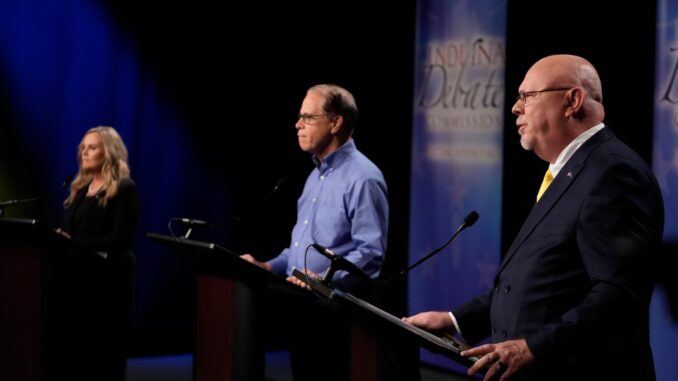
Democratic Vice President Kamala Harris and Republican former President Donald Trump will compete for Indiana’s 11 electoral votes on Election Day, with a full slate of other federal and state races rounding out the ballot. Two of the state’s top elected leadership positions will change hands after the Nov. 5 general election, with no incumbents running for governor or U.S. senator.
Republican presidential nominees have carried Indiana in 13 of the last 14 presidential elections. The lone exception was 2008, when then-Sen. Barack Obama became the first Democrat to win the Hoosier State since President Lyndon Johnson. The state has not been competitive since. Neither Harris nor Trump have campaigned there since officially becoming their parties’ nominees. Harris did address members of the historically Black sorority Zeta Phi Beta in Indianapolis on July 24, just three days after her former running mate, President Joe Biden, dropped out of the race.
Republican U.S. Sen. Mike Braun is giving up his seat as he campaigns for governor. Spending by Democratic gubernatorial nominee Jennifer McCormick has made the race more competitive than expected. Another interesting twist is the presence of a third-party candidate with strong support: Libertarian Donald Rainwater, who captured 11% of the vote in 2020.
In the race to take Braun’s U.S. Senate seat, Republican U.S. Rep. Jim Banks faces Democrat Valerie McCray. Meanwhile, Democratic U.S. Rep. Frank Mrvan seeks a third term in Indiana’s 1st Congressional District. Although not a top GOP target this cycle, Mrvan is more vulnerable than the state’s only other Democratic congressman, Andre Carson, in the 7th District. Mrvan took home 53% of the vote in his latest victory in the northwest Indiana district. Biden received about the same share of the vote in the district in 2020.
In the state Legislature, Republicans hold and are expected to keep a veto-proof supermajority. Half of 50 state Senate seats and all state House seats are up for election.
Nov. 5 will be the first general election where new voter ID laws will be in effect. Republican lawmakers passed measures to tighten mail-in voting requirements, and first-time voters now must supply proof of residency in order to register to vote. Most polls in the state close at 6 p.m. ET — the earliest closing time in the country.
Here’s a look at what to expect in the 2024 election in Indiana:
Nov. 5.
6 p.m. and 7 p.m. ET. Indiana covers two time zones, so most of the state will start reporting results while some voters in the southwest are casting ballots until 7 p.m. ET.
11 awarded to statewide winner
President: Harris (D) vs. Trump (R) vs. Chase Oliver (Libertarian) vs. Robert F. Kennedy Jr. (We the People).
U.S. Senate: Banks (R) vs. McCray (D) and one other.
Governor: Braun (R) vs. McCormick (D) vs. Donald Rainwater (Libertarian).
U.S. House, state Senate, state House, attorney general and a ballot measure.
2020: Trump (R) 57%, Biden (D) 41%, AP race call: Tuesday, Nov. 3, 2020, 8:52 p.m. ET.
Registered voters: 4,813,264 (as of Oct. 10, 2024).
Voter turnout in 2020 presidential election: 64% of registered voters.
Votes cast before Election Day 2020: about 61% of the total vote.
Votes cast before Election Day 2022: about 36% of the total vote.
Votes cast before Election Day 2024: See AP Advance Vote tracker.
First votes reported, Nov. 3, 2020: 6:03 p.m. ET.
By midnight ET: about 77% of total votes cast were reported.
___
AP writers Hannah Fingerhut and Maya Sweedler contributed to this report.
___
Read more about how U.S. elections work at Explaining Election 2024, a series from The Associated Press aimed at helping make sense of the American democracy. The AP receives support from several private foundations to enhance its explanatory coverage of elections and democracy. See more about AP’s democracy initiative here. The AP is solely responsible for all content.


Be the first to comment